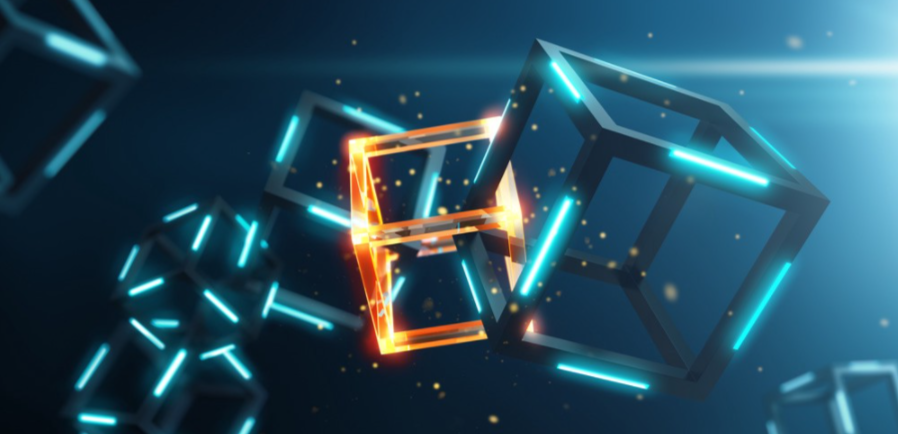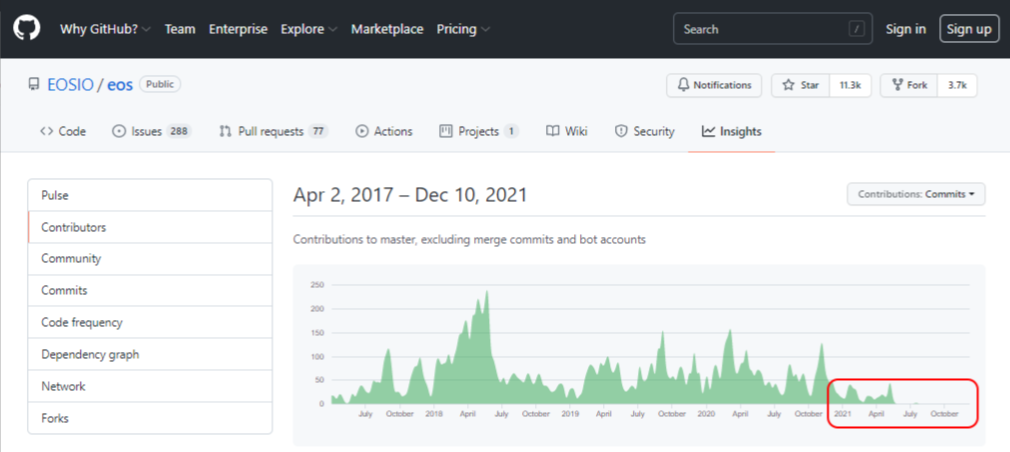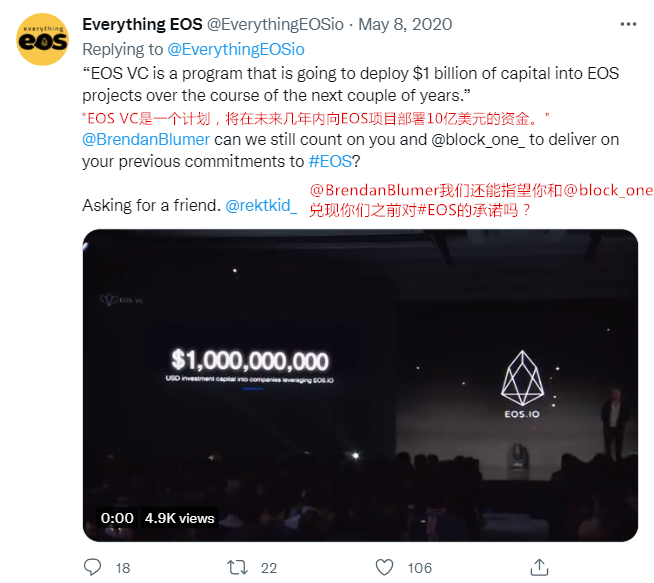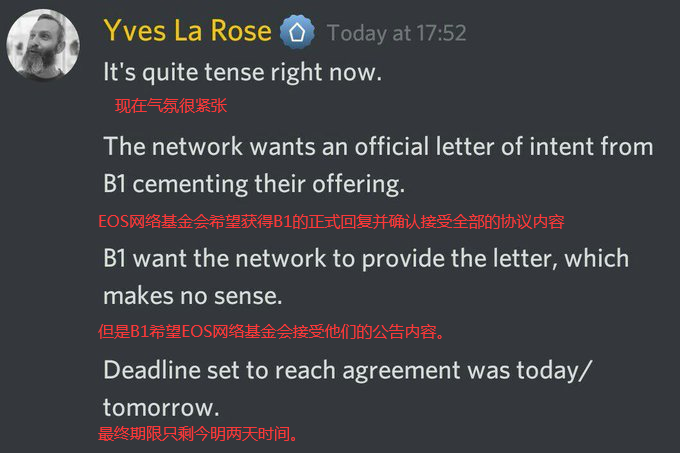
At the request of Brock Pierce, most of the top 30 Block Producers (BPs) participated in a meeting at 02:00 UTC on December 9th (10:00 Beijing time) to discuss stopping the release to Block.one After tokens, is it possible for the two parties to continue negotiations. After the discussion at the meeting, we made the following statement:
Over the past year, we have seen a significant decline in the speed and quality of Block.one's EOSIO code output.
After many senior developers who created the original EOSIO code began to leave Block.one (including EOS founder, former Block.one CTO Daniel Larimer, and other original core contributors) and chose to rejoin the EOS community in another way, Block. This decline in one was evident, with the few senior developers remaining on Block.one being reassigned to work on Bullish. This is evident in the last two iterations of EOSIO 2.1 and EOSIO 2.2.

In the past three years, the EOS community has often discussed whether Block.one has fulfilled the promise they made when the EOS network was created. Block.one can obtain about 27,400 EOS released every day, which is equivalent to the income of about 60 BPs. sum.
Promises they failed to deliver on include:
Did not implement any type of inter-blockchain communication (IBC) solution;
The promise of "1 million transactions per second" has never been realized;
Promise to launch over 1000 dApps;
The promise of a decentralized social media platform (aka Voice)…

There are so many of them. The facts are very objective and clear, Block.one does not provide continuous core code development, which is not only disappointing to the EOS community, but also to all developers building an ecosystem around EOSIO.
Many BPs on EOS also provide infrastructure construction for other public chains besides EOSIO, so the interruption of core code development support has a huge impact.
Questions raised by the above issues culminated in early November, when Block.one issued an announcement announcing that they had sold 45 million EOS tokens to Brock Pierce for the launch of Helios VC.
Supporting the ecosystem construction itself is not a problem, the problem is that out of the 45 million tokens sold, only 8 million tokens were released and belonged to Block.one, while the remaining 37 million tokens should have been gradually released over the next 7 years freed.
The current rules of the EOS network are: the release of tokens and the determination of ownership should be jointly decided by the network. Block.one sold assets that did not belong to him without attribution.
The community elected the EOS Network Foundation as a representative. On November 7th, the tripartite negotiation with Block.one CEO Brendan Blumer and Brock Pierce officially started, and a face-to-face meeting was held on November 10th. BPs with governance rights on the chain follow up the negotiations in real time and provide feedback and guidance to the EOS Network Foundation. In the next four weeks, the negotiations fully exchanged views of various parties.
BPs have repeatedly asked: Block.one needs substantive changes, and hopes that Block.one will use the $4.1 billion raised at the beginning of the EOS network (currently valued at more than $10 billion) as an external capital injection for the EOS ecosystem. Ongoing maintenance and construction, but promptly rejected by Block.one each time.
The final solution was proposed on November 24th:
Block.one gave 45 million EOS to Helios, 30 million EOS to the EOS Network Foundation, 1 million EOS to the EOS ecological financing platform Pomelo, and 1 million EOS to the governance system EdenOS;
Block.one must return the EOS-related IPs it holds, including community accounts, eos.io domain names, etc. to the community;
The completion time is set before December 8th.
The proposal is only a slight revision of what was left when the two sides parted ways on Nov. 10. Throughout the process, Block.one stated that they do not own the EOSIO IP because Block.one has transferred the EOSIO IP to Bullish. However, EOS Ecology believes that EOSIO IP does not belong to Block.one, and Block.one has no right to transfer EOSIO IP. EOS Ecology does not recognize this transfer behavior.
In the end, the two sides made some compromises and made new demands: Block.one admitted that they failed to fulfill their promises, and at the same time publicly proposed to cooperate with the EOS ecosystem to obtain EOSIO IP.
This is our concession, and the EOS network has come a long way in order to repair the trust that has been eroded in the EOS ecosystem for a long time.
Subsequently, the EOS Network Foundation arranged and drafted a term sheet (Letter of Intent), but Block.one did not respond in time.
Most of the top 30 BPs held a meeting on the night of November 30th, and agreed to set the deadline for Block.one to respond as UTC time on December 7th at 22:59 UTC (December 8th at 6:59 Beijing time) ) to prompt Block.one to respond to publicly acknowledge the proposal, while knowing how long it will take to implement it. There is no deadline for the implementation of the proposal.
Before this deadline, BPs deploy a multi-signature proposal, which reads:
Unreleased coins in the Block.one account, stop releasing
Remove votes on Block.one account
The EOS Network Foundation publicly stated: BP will multi-sign the proposal every day before the deadline. This will allow EOS token holders more time to think about whether to agree to stop releasing tokens to Block.one, so that BPs can make voting choices that are more in line with ecological needs.
On December 5th, Block.one disclosed the token part mentioned in the agreement. However, the announcement still makes no public mention of EOS IP.

By December 7th, more than 20 top-ranked BPs disclosed their positions on the chain through multi-signature voting. In the end, Block.one failed to complete the response before the deadline, and the multi-signature was executed at 04:55 UTC time on December 8 (12:55 Beijing time).
This is a feat of EOS ecological governance. Stopping the release of tokens to Block.one is an action jointly decided by the EOS ecology. It not only meets the demands of the EOS ecology, but also expresses the seriousness of the situation and the firmness of BPs to Block.one. This is the spirit and power of the blockchain, enabling the community to stand up against companies with interests that are not in the same direction as the community.
The EOS ecosystem has not confiscated any tokens from Block.one, no tokens in the Block.one account have been taken away, the account has not been changed, the key has not been modified, but the EOS network no longer releases tokens from the eosio.stake account to Block.one, That's all.
This does not mean that Block.one will be exonerated from their responsibilities, as they still hold the entire $4.1 billion raised during the token sale (2017-2018), and about 32 million EOS that have been released. Block.one must continue to honor the promises they made during and after the token sale. In addition, the view that EOSIO IP belongs to private for-profit entities and not to the EOS community is completely inconsistent with the consensus of the EOS network.
Any decision we make has strong support from BPs, token holders, and ecological participants.
The goal of the blockchain consensus mechanism is to connect those who have the ability to produce blocks with the token holders. In an ideal consensus mechanism, any decision made by those empowered by the network should be fully aligned with the stakeholder consensus.
At present, the EOS network uses the token voting governance model. The decisions we make follow the governance mechanism of the EOS network. If you believe in token governance, as long as you follow the process, the final result will be reasonable. Everyone involved in EOS agrees to this mechanism and follows this mechanism, so it makes sense to respect and support the legitimacy of the result.
That's not to say we can't keep working on building better mechanisms. In fact, the first investment of the EOS Network Foundation is to fund the development of EdenOnEOS to explore better governance solutions. We will continue to do so, as better consensus alignment strengthens the buy-in of all stakeholders in the network.
In November, the EOS token holder community came together to cast doubt on Block.one and reached out, hoping to reach a consensus so that we can end the fragmented state of EOS and start a new chapter. The community has given Block.one a chance to make amends so we can all move towards the same goal with respect and unity. This is the common aspiration of the EOS network.
ENF will continue to lead the development of the EOS network as the representative of the world's largest DAO. As we enter a new era, we will welcome new investors, developers, businesses and individuals with open arms.
To quote Margaret Mead:
"Never underestimate the power of a small group of dedicated people to change the world. They are powerful and one of a kind."
Yves La Rose
EOS Foundation Executive Director
The EOS Network Foundation is a non-profit organization that aims to listen to the voice of the community, convey the wishes of the community, and support the development of high-quality projects in the community. It will become an information sharing bridge for the EOS community and provide funds, technology, operations, future planning, Key infrastructure support such as ecological construction further develops the full potential of EOS as the world's fastest governance-based blockchain.
The EOS Network Foundation is a non-profit organization that aims to listen to the voice of the community, convey the wishes of the community, and support the development of high-quality projects in the community. It will become an information sharing bridge for the EOS community and provide funds, technology, operations, future planning, Key infrastructure support such as ecological construction further develops the full potential of EOS as the world's fastest governance-based blockchain.
Follow the EOS Network Foundation Discord: http://discord.gg/eos-network
Follow EOS Network Foundation on Twitter: https://twitter.com/EOSFoundationCN
Follow the EOS Network Foundation Chinese Medium: https://medium.com/@EOSNetworkFoundation
EOS Network Foundation Telegram Chinese Subscription Number: https://t.me/EosNetworkFoundation_CN
EOS Network Foundation Chinese Telegram Group: https://t.me/EOSCN